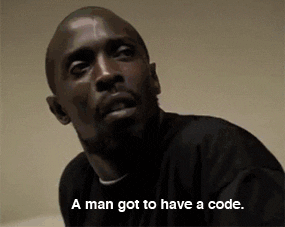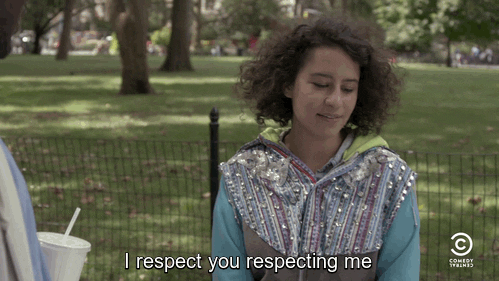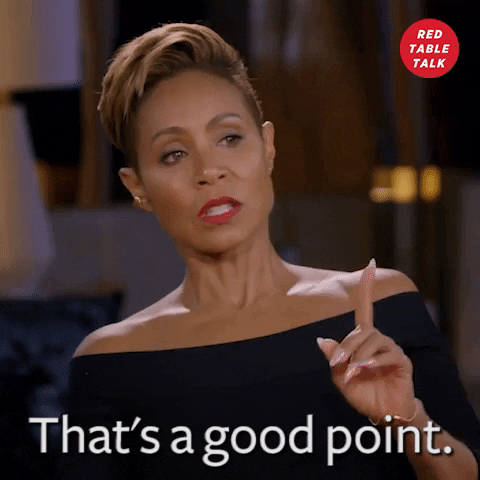6 Things To Consider Before Getting Into An Interfaith Relationship

Being that I am a marriage life coach, I often get asked if I subscribe to interfaith marriages. Well, being that I am also a Bible follower (not an evangelical by any stretch, but I do strive for discipleship—John 8:31-32), I have to take into account that the Bible has interfaith couples. One that immediately comes to mind is Boaz and Ruth. He was Hebrew, she was a Moabite—there you have it; an interfaith relationship. (By the way, if you read the story, you might change your tune about "I'm waiting on my Boaz."
If you want to be pursued, you're not waiting on a Boaz kind of man. Ruth—and Naomi—did a significant amount of the work in that love story. Check the records.) So were Moses and Zipporah and King Xerses and Esther. I think you get the gist. So no, I can't say, right off the rip, that interfaith relationships or marriages are "bad" or wrong.
Apparently, I'm not the only one to think that either. While in the United States, around 69 percent of married people say that their spouse shares their faith, there is a remaining 31 percent whose spouse does not; that number continues to climb too. As I did some additional digging around, I also discovered that while about one-third of all evangelical marriages end in divorce, that number jumps up to 50 percent if the union is an interfaith one. Also, if an evangelical marries someone who isn't religious at all, that divorce rate jumps to 62 percent. So clearly, although a lot of people are dating and marrying someone who doesn't share their faith, there are some risks that come with making the decision to do so.
That's why, if you're currently seeing someone who has a different faith than you or you're single and considering getting into an interfaith relationship, while it's not something that you should automatically write off, there are some things that you should think long and hard about before moving forward.
Is Your Goal Dating or Courtship?

If you're someone who "dates to marry", then this first point doesn't really apply to you. But since I know that there are a ton of people who can totally relate to articles like "Single Minded: So, What If You Like Dating But DON'T Desire Marriage?", that's why I thought this was a good starting point. While a lot of religious people, of any faith, feel that there is no need to date if you're not looking for something long-term, I know that some individuals do it for other reasons than to find a serious partner. Some people date in order to meet new people and gain fresh perspectives. Some people date simply because they enjoy the company of others. Some people date in order to figure out what they ultimately do want for their future. This is why it's so important to know why you do the things that you do. Are you dating simply to create some memories and have a good time in the moment? Or are you hoping that dating will turn into courtship (because no, dating and courtship aren't one in the same)?
I personally know of some couples who ended up breaking up because they did not ask themselves this question before getting into an interfaith relationship. Six months to a year in, they ended up coming to the decision that their different faith perspectives were too much to try and make their relationship go the distance. Feelings were deeply hurt because of it. This happens more than a lil' bit, so definitely ask yourself if you would go into an interfaith dynamic for casual reasons or, if it is long-term, if you are prepared to make some serious compromises in order to keep the connection intact (see "Interfaith Marriages Can Require Big Compromises").
Are Your Core Values and Principles Going to Be Compromised in Any Way?

Speaking of compromise, since I know that there are a lot of Christian women who support our site, and since I'm also aware of the fact that there are literally dozens and dozens of different denominations within the Christian "umbrella" (several sources say that there are around 200; you can cite that info here and here), it's worth mentioning that you can date a Christian but if they aren't apart of the same denomination as you, there can still be conflict. I've dated a Muslim before and honestly, when it came down to our core values and principles, we got along pretty well. Oh, but when I dated someone who was a Christian but wasn't the same denomination as I was—back when I was a part of one—pardon the pun but all hell broke loose. While we're here, please don't believe that non-denominational or interdenominational don't have strong denominational influences. I attended a "non-denominational church" for years but the influence was clearly what the first lady was—COGIC.
My point is this—when it comes to our core values and principles, if you're looking for the kind of relationship that is going to be long-term, you need to be with someone who complements both of those. How do you prioritize your career? How important is family to you? What are your views on sex? Where do you stand when it comes to political and social justice issues? What qualities do you value most in a relationship? What place do you give to boundaries and self-care? And yes, how important is religion to you? Don't assume that if you're Baptist who is dating someone who is Church of Christ or even is also Baptist that the relationship will automatically be smooth sailing. At the same time, don't assume that someone who is Buddhist or Bahá'í won't align with you in some unexpected ways.
The key is to know where you stand and then not to compromise on those things if you feel like you will be sacrificing the core of who you are in order to do so. At the end of the day, one of the articles that I read stated something that I agree with—"80% of those who are in an interfaith marriage believe that having similar values is more important than having a similar faith." Values over faith. Definitely not something that needs to be underestimated.
Will You Both Respect Each Other’s Beliefs?

I won't lie. Some of my most heated discussions involve the topic of religion. Hmph. Don't even get me started on Kanye. See, I'm already triggered. It's cool to have people in my world who are Christian, Jewish, Muslim, Buddhist, Bahai, Catholic, agnostic, atheist—I've even had some interesting conversations with Satanists before (heads up—Satanists don't subscribe to worshipping Satan but self; a lot of people don't know that). The reason is they can provide insights and perspectives that 1) I've probably never considered before and 2) can help to either strengthen my own faith or compel me to do more studying and researching. Y'all, you can't end up coming to this conclusion if you don't respect the religious views of others—first.
If you're not hearing someone else out, you're being disrespectful. If you think you've got so much "truth" that you are condescending and patronizing (I am floored by how many people of one faith try and actually tell someone of another faith what that person's faith is all about instead of listening to them), you're being disrespectful. On the dating tip, if what you're actually doing is "missionary dating"—meaning, you claim it's dating but really what you're doing is trying to convert someone—you're being disrespectful. If all you seem to be able to do is see the good in your faith and the "bad" in someone else's, you're being disrespectful. If you're trying to invoke—or provoke—fear into someone in order for them to see things your way, you are being disrespectful. If you are flippant and dismissive about how someone else views God or a higher power, yep—you are being disrespectful.
I'll tell you what—if there is an irony that comes out of interfaith relationships, it's the fact that it has the ability to reveal to people if they are as "godly" and "loving" as they think that they are. Because if you are dating someone of a different faith and you are rude, offensive and intolerant—what kind of religion are you in? You might want to seek another one. Real talk.
If the Desire Is Marriage and Kids, How Will You Raise Them?

When it comes to this particular point, the person who immediately comes to my mind is Bill Maher. No matter what you think about him, if you're considering or are already in an interfaith relationship, I encourage you to watch (or re-watch) his documentary from back in the day entitled Religulous. Not only does it touch on some points that are definitely worth pondering, it also provides a great example for why I brought up this part of the article up. Bill? He had one parent who was Catholic and one who was Jewish. Geeze. I'm not sure if it gets more extreme than that, just on the Christ points alone. That's why I can see how he struggles with issues of faith, religion and spirituality; why he's always looking for contradictions. Just look at how his upbringing had its own set of 'em.
There are some people close to me who have two young children. The mother is a Christian and the father isn't; he doesn't really affiliate with any faith. That has caused some real challenges when it comes to how they see church-going, holiday observances and even how the home should function when it comes to gender roles, spirituality and a host of other things. When it was just the couple, while they were both a little irritated by a few differences in perspectives, it wasn't that big of a deal. Now that they are raising little humans, though, they are in counseling more than they've ever been.
Moral to the story. If you are already in an interfaith relationship and you are contemplating marriage, have some serious conversations about if you both desire to have children and, if so, how they should be raised. Don't be out here in la-la-land thinking that you'll just cross that bridge when you get to it. If you wait until then, you might end up with a child who is super confused (and perhaps also mad disinterested) when it comes to the issue of faith. Not because of faith itself but because of all of the contradictions they witnessed while growing up…in your household.
Do You Get That You Can Be “Unequally Yoked” Beyond One’s Faith?

The kind of Christians I know who think that an article like this is totally ridiculous, they tend to feel that way due to a Scripture in the Bible that says, "Do not be unequally yoked together with unbelievers. For what fellowship has righteousness with lawlessness? And what communion has light with darkness?" (2 Corinthians 6:14—NKJV) It's in the Scriptures, no question.
To that, I just want to present something for you to consider. Is an "unbeliever" only someone who doesn't share your religious perspective? Could it quite possibly also speak to someone who doesn't complement your life, in general? Could it be someone who actually doesn't believe…in you?
Sharing the same religious or spiritual beliefs with someone is important; there is no debating that. But Christians actually divorce more than any other faith in the world. And that kind of actually proves the point that I'm trying to make here. Don't be out here thinking that if you share the same faith with someone that you are automatically in sync with them. In order to walk together in a true partnership, make sure you are on the same page about if you believe in one another too.
Can You Truly Agree to Disagree?

Ask any married couple who has any real time under their belt and they're going to tell you that if you want to have peace in your household, there are going to be some things that you will simply need to "agree to disagree" on. And boy, no greater words could be spoken than when it applies to an interfaith relationship. Take the holidays, for example. I once interviewed a wife on the topic of interfaith unions. Because she was Jewish and her husband was Christian, Christmas used to be a nightmare in her house because she thought that celebrating the birth of what her faith sees as a prophet vs. what her husband sees as the Savior of mankind couldn't be more blasphemous. She said that she finally got OK with some of the things that her husband wanted to do, simply because of the peace and joy that his attitude brought into their home that time of the year. "Christmas irks me, but it's only for a day. I can deal with all of the hoopla for 24 hours."
If you want to make your own interfaith marriage work and last, this is the kind of attitude that you need to be prepared to have about a lot of things. Again, even if you are both in the same faith but are a part of different denominations. I am a Sabbath observer. Tons of the people I've dated go to church on Sunday. We both are Bible believers, but that one thing alone can still cause conflict. See what I mean?
As I bring this to a close, this final point is a great reminder that, in the midst of your pondering, keep in mind that if you are controlling, intolerant or impatient, an interfaith relationship is absolutely not for you. Because in order to make that type of relationship work and last, you need to be the opposite of each of those traits. You need to have faith that two different faiths have enough mutual love and respect to work through the differences. If you don't honestly believe that, it's a big world out here. Opt for someone who shares your faith—so that hopefully joy, peace and harmony will be at you and yours' foundation. After all, that should be the ultimate goal. Whether two people share the same faith—or not.
Want more stories like this? Sign up for our newsletter here and check out the related reads below:
If Your Man Is Missing These Things, Wait Before Marrying Him
The 'Pre-Commitment Interview' Every Dating Couple Should Have
How To Ground Yourself Spiritually
These 8 Scriptures Are Spiritual Game-Changers For Single Women
Feature image by Shutterstock
- Interfaith Relationships: The Path to Truth | Ghazala Hayat ... ›
- Ecumenical and Interfaith Marriages - For Your Marriage ›
- 7 Ways To Make Interfaith Relationships Work ›
- The Life Cycle of an Interfaith Relationship: Having a Baby ... ›
- Interfaith Marriage Mistakes You Need to Avoid ›
- 4 Questions Every Interfaith Couple Should Ask Before Getting Serious ›
Exclusive: Viral It Girl Kayla Nicole Is Reclaiming The Mic—And The Narrative
It’s nice to have a podcast when you’re constantly trending online. One week after setting timelines ablaze on Halloween, Kayla Nicole released an episode of her Dear Media pop culture podcast, The Pre-Game, where she took listeners behind the scenes of her viral costume.
The 34-year-old had been torn between dressing up as Beyoncé or Toni Braxton, she says in the episode. She couldn’t decide which version of Bey she’d be, though. Two days before the holiday, she locked in her choice, filming a short recreation of Braxton’s “He Wasn’t Man Enough for Me” music video that has since garnered nearly 6.5M views on TikTok.
Kayla Nicole says she wore a dress that was once worn by Braxton herself for the Halloween costume. “It’s not a secret Toni is more on the petite side. I’m obsessed with all 5’2” of her,” she tells xoNecole via email. “But I’m 5’10'' and not missing any meals, honey, so to my surprise, when I got the dress and it actually fit, I knew it was destiny.”
The episode was the perfect way for the multihyphenate to take control of her own narrative. By addressing the viral moment on her own platform, she was able to stir the conversation and keep the focus on her adoration for Braxton, an artist she says she grew up listening to and who still makes her most-played playlist every year. Elsewhere, she likely would’ve received questions about whether or not the costume was a subliminal aimed at her ex-boyfriend and his pop star fiancée. “I think that people will try to project their own narratives, right?” she said, hinting at this in the episode. “But, for me personally – I think it’s very important to say this in this moment – I’m not in the business of tearing other women down. I’m in the business of celebrating them.”
Kayla Nicole is among xoNecole’s It Girl 100 Class of 2025, powered by SheaMoisture, recognized in the Viral Voices category for her work in media and the trends she sets on our timelines, all while prioritizing her own mental and physical health. As she puts it: “Yes, I’m curating conversations on my podcast The Pre-Game, and cultivating community with my wellness brand Tribe Therepē.”
Despite being the frequent topic of conversation online, Kayla Nicole says she’s learning to take advantage of her growing social media platform without becoming consumed by it. “I refuse to let the internet consume me. It’s supposed to be a resource and tool for connection, so if it becomes anything beyond that I will log out,” she says.
On The Pre-Game, which launched earlier this year, she has positioned herself as listeners “homegirl.” “There’s definitely a delicate dance between being genuine and oversharing, and I’ve had to learn that the hard way. Now I share from a place of reflection, not reaction,” she says. “If it can help someone feel seen or less alone, I’ll talk about it within reason. But I’ve certainly learned to protect parts of my life that I cherish most. I share what serves connection but doesn’t cost me peace.
"I refuse to let the internet consume me. It’s supposed to be a resource and tool for connection, so if it becomes anything beyond that I will log out."

Credit: Malcolm Roberson
Throughout each episode, she sips a cocktail and addresses trending topics (even when they involve herself). It’s a platform the Pepperdine University alumnus has been preparing to have since she graduated with a degree in broadcast journalism, with a concentration in political science.
“I just knew I was going to end up on a local news network at the head anchor table, breaking high speed chases, and tossing it to the weather girl,” she says. Instead, she ended up working as an assistant at TMZ before covering sports as a freelance reporter. (She’s said she didn’t work for ESPN, despite previous reports saying otherwise.) The Pre-Game combines her love for pop culture and sports in a way that once felt inaccessible to her in traditional media.
She’s not just a podcaster, though. When she’s not behind the mic, taking acting classes or making her New York Fashion Week debut, Kayla Nicole is also busy elevating her wellness brand Tribe Therepē, where she shares her workouts and the workout equipment that helps her look chic while staying fit. She says the brand will add apparel to its line up in early 2026.
“Tribe Therepē has evolved into exactly what I have always envisioned. A community of women who care about being fit not just for the aesthetic, but for their mental and emotional well-being too. It’s grounded. It’s feminine. It’s strong,” she says. “And honestly, it's a reflection of where I am in my life right now. I feel so damn good - mentally, emotionally, and physically. And I am grateful to be in a space where I can pour that love and light back into the community that continues to pour into me.”
Tap into the full It Girl 100 Class of 2025 and meet all the women changing game this year and beyond. See the full list here.
Featured image by Malcolm Roberson
If there is one thing that I am going to do, it’s buy myself some scented soy candles. And, as I was looking at a display of them in a TJ Maxx store a couple of weekends ago, I found myself wondering just who decided which scents were considered to be “holiday” ones. The origin stories are actually pretty layered, so, for now, I’ll just share a few of ‘em.
I’m sure it’s pretty obvious that pine comes from the smell of fresh Christmas trees; however, scents like cloves, oranges, and cinnamon are attributed to two things: being natural ways to get well during the cold and flu season, and also being flavors that are used in many traditional holiday meals.
Meanwhile, frankincense and myrrh originate from the Middle East and Africa (you know, like the Bible does — some folks need to be reminded of that—eh hem — Trumpers) and ginger? It too helps with indigestion (which can definitely creep up at Thanksgiving and Christmas dinner tables); plus, it’s a key ingredient for ginger snaps and gingerbread houses. So, as you can see, holiday-themed scents have a rhyme and reason to them.
Tying this all in together — several years ago, I penned an article for the platform entitled, “Are You Ready To Have Some Very Merry ‘Christmas Sex’?” Well, in the spirit of revisiting some of that content, with a bit of a twist, I decided to broach some traditional holiday scents from the perspective of which ones will do your libido a ton of good from now through New Year’s Eve (check out “Make This Your Best NYE. For Sex. EVER.”).
Are you ready to check some of them out, so that, whether it’s via a candle, a diffuser, some essential oil, or some DIY body cream (check out “How To Incorporate All Five Senses To Have The Best Sex Ever”), you can bring some extra festive ambiance into your own boudoir? Excellent.
1. Vanilla

Unsplash
When it comes to holiday desserts, you’re going to be hard-pressed to find recipes that don’t include vanilla — and that alone explains why it is considered to be a traditional holiday scent. As far as your libido goes, vanilla is absolutely considered to be an aphrodisiac — partly because its sweet scent is considered to be very sensual. Some studies even reveal that vanillin (the active ingredient in vanilla) is able to increase sexual arousal and improve erectile dysfunction in men. So, if you adore the smell, here is more incentive to use it.
2. Frankincense

Unsplash
Although, typically, when people think about frankincense (and myrrh), it’s in the context of the gifts that the wise men brought Christ after he was born; it’s a part of the biblical Christmas story. However, frankincense goes much deeper than that. Sexually, since it has an earthy and spicy scent, some people like to use it to meditate (check out “What Exactly Is 'Orgasmic Meditation'?”). Also, since it has the ability to put you in a better mood, soothe and soften your skin and maintain your oral health — with the help of frankincense, every touch and kiss can be that much…sexier.
3. Cinnamon

Unsplash
I already gave cinnamon a shout-out in the intro. Personally, I’ve been a fan of it, in the sex department, for a long time now (check out “12 ‘Sex Condiments’ That Can Make Coitus Even More...Delicious”). When it’s in oil form, it can be very sweet to the taste while sending a warm sensation throughout the body — which is why the giver and receiver of oral sex can benefit from its usage. Beyond that, cinnamon helps to increase blood flow to your genital region, elevate sexual desire and, some studies say that it can even help improve fertility. Beautiful.
4. Peppermint

Unsplash
If there’s a signature candy for the holiday season, it’s probably a candy cane — which automatically puts peppermint in the running for being an official holiday scent. Pretty much, in any form, it’s got your sex life’s back because it’s hailed as being a sexual stimulant; in part, because its smell is so invigorating. Plus, it helps to (eh hem) ease headaches, it gives you more energy and it can definitely help to freshen your breath. Also, that minty sensation? The same thing that I said about cinnamon can apply to peppermint too (if you catch my drift).
5. Ginger

Unsplash
Whether it’s in a meal or in your bedroom, ginger is going to produce results that are hella spicy. On the sex tip, science has praised ginger for being able to increase sexual arousal, improve blood circulation (which intensifies orgasms) and strengthen fertility for many years. Scent-wise, I find it to be one that both men and women enjoy because it is both woodsy and sweet. So, if you’ve got some massage oil in mind, adding some ginger is a way to please you both.
6. Pomegranate

Unsplash
September through December is the time of year when pomegranates are considered to be in season. And, as someone who is a Rosh Hashanah observer, I have a personal adoration for them because I am aware of the various things that they symbolize in Hebrew culture including the fact that they are a fruit that represents love and fertility. So yeah, they would absolutely be an aphrodisiac — one that is perfect for this time of the year. While consuming it helps to boost testosterone levels in both men and women, the floral bittersweet smell that it produces can help to reduce stress while promoting relaxation (like most floral scents do) — and the more relaxed you are, the easier it is to climax.
7. Nutmeg

Unsplash
Another signature seasoning during the holiday season is nutmeg. It’s perfect in Thanksgiving sweet potato (or pumpkin) pie and Christmas morning French toast. And yes, it can also make your sex life better. If you consume it, it can intensify your libido and, overall, its warm-meets-spicy-meets-sweet smell is so inviting that it is considered to be a pretty seductive scent.
8. Cloves

Unsplash
I ain’t got not one lie to tell you — if you’ve got a toothache, put some clove oil on that bad boy and send me a Christmas present for putting you on game. Aside from that, as I round all of this out, cloves are another holiday scent that can do wonders for your sex life. For men, it has the ability to significantly increase sexual arousal and improve stamina and endurance. For men and women alike, it also has a reputation for strengthening sexual desire. And for women solely? Well, if you want an all-natural way to increase natural lubrication down below — the scent and and feel (in DILUTED oil form) can make that happen. It can make the holidays especially special…if you know what I mean.
Ah yes — the atmosphere of the holidays and what it can do.
Take it all in! Scent ‘n whatever stimulating that comes with it! #wink
Let’s make things inbox official! Sign up for the xoNecole newsletter for love, wellness, career, and exclusive content delivered straight to your inbox.
Featured image by Giphy









